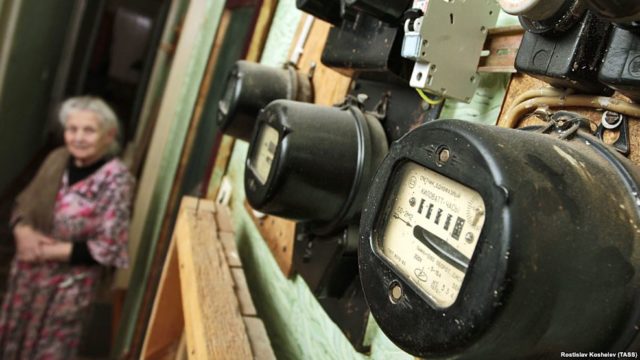
Ukrainian Government Moves Ahead With Some Important Energy Reforms, Stumbles on Others
Publication: Eurasia Daily Monitor Volume: 13 Issue: 160
By:

Ukraine has approved reforms aimed at changing domestic electricity market rules, a step that is essential for curbing corruption in the power sector. This complements the natural gas pricing reforms undertaken earlier, in 2015–2016, which achieved price parity on the domestic market with import prices; all Ukrainian consumers now pay more or less equal prices for gas. At the same time, an ill-prepared attempt by the Ministry of Economy to cut the monopoly of the national oil and gas company Naftohaz Ukrainy on the gas market has fallen through. Kyiv is pressed for time to reform the energy sector as it is short of money to pay its debts and import natural gas for the coming winter. Creditors have made it clear that there will be no new loans without additional reforms.
United States Vice President Joseph Biden met with Ukrainian President Petro Poroshenko on September 20 and urged faster reforms in energy (UNIAN, September 21). And earlier in September, European Commission Vice President Maroš Šefčovič made it clear, on his visit to Kyiv, that 600 million еuros ($673 million) in assistance, expected since last year, would arrive only once the government sped up reforms in the energy sector (Ukrinform.ru, September 2).
On September 22, the Ukrainian parliament gave preliminary approval to government plans to reform the national electricity market, and it also gave final approval to reform the national power regulator. The electricity market bill is designed to replace the existing model of a single market operated by the state enterprise Enerhorynok (Energy Market) with a new multi-layer structure to comprise several types of markets such as a market of bilateral contracts, a day-ahead market, a balancing market, etc. Once the system is implemented, local electricity market participants will have more freedom to choose partnerships, conditions and prices. This is likely to facilitate Ukraine’s eventual integration into the European Union’s common energy market (Epravda.com.ua, September 22).
The legislation on the energy regulation commission was the second important bill related to the electricity market; it was expected by Western creditors since last spring. This bill, however, raised questions about the political independence of the future power regulator, as it will be comprised of people appointed by a body consisting of two appointees of parliament, two of the president and one of the prime minister (Zn.ua, September 22). The current head of government, Prime Minister Volodymyr Hroysman, is an ally of President Petro Poroshenko, so it will be ultimately up to the president’s team to decide who will run the power regulator. Incidentally, the current head of the power regulator, Dmytro Vovk, is a former manager of Poroshenko’s confectionery business in Russia.
Nonetheless, the West welcomed the steps Ukraine has taken so far to reform its electricity market. Within hours after the vote in parliament, Ukraine issued $1 billion worth of Eurobonds under US government guarantees, and the European Commission office in Ukraine hailed the results of the voting. New rules on the electricity market promise to curb corruption, better protect consumers’ rights, and open the door to investors in the sector, according to the EU Commission office statement (Eurointegration.com.ua, September 22).
An attempt carried out by the Ukrainian Ministry of Economy to unbundle the state-run behemoth Naftohaz was more controversial and ended in a flop, showing that hasty reforms can cause damage. In early September, the ministry altered Naftohaz’s charter so that its trunk pipeline operating subsidiary, Ukrtranshaz, would report directly to the ministry rather than Naftohaz. Moreover, Ukraine’s economics ministry would now appoint and dismiss Ukrtranshaz’s board members. The ministry said the changes were designed to make the pipeline operator independent from Naftohaz, in compliance with the European Third Energy Package, which Ukraine adopted (Me.gov.ua, September 16). However, Naftohaz said the ministry’s decision in fact contradicted the EU Energy Package. Naftohaz warned that the World Bank and the European Bank for Reconstruction and Development (EBRD) would refuse to lend a total of $800 million for gas imports this year because under the reform plan agreed with Ukraine’s creditors in July, an independent board, rather than the Ministry of Economy, was supposed to manage Ukraine’s trunk pipelines (Naftogaz.com, September 16). The EBRD and the European Energy Community voiced their concerns, Poroshenko intervened, and the government eventually backed away from its decision. At a September 19 meeting chaired by Prime Minister Hroysman and attended by US Ambassador Mary Jovanovich and representatives from a number of international financial institutions, it was decided to set up a working group on reforming Naftohaz, and to cancel the economy ministry’s decision on Ukrtranshaz (biz.liga.net, September 19).
It is not easy for Kyiv to reform the energy sector, which represents a large portion of the domestic economy and which for many years has been a hotbed of corruption. The government has already failed to meet its own September deadline to set up an independent operator to run Ukraine’s pipeline grid, to replace Ukrtranshaz. However, with no national elections this or next year, Ukrainian lawmakers are not currently under pressure from the electorate to push populist policies. Thus, now is probably the best moment for Ukraine’s government to adopt much-needed decisive reforms, and the West is ready to support such reforms with additional loans.



